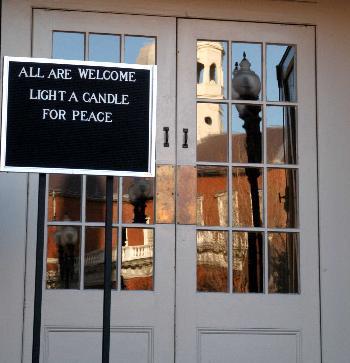
At the doors of the First Unitarian Universalist Church in Cambridge yesterday, a sign invites visitors to light candles in hope of peace.
As war begins in Iraq, some alums and at least one current Harvard student remain in the Middle East, and some say that despite the danger, they prefer Jerusalem to Cambridge.
Friends still at Harvard, meanwhile, sit glued to newscasts, eager for information about their safety.
According to a presentation made to the Faculty Council yesterday, 89 undergraduates and 160 students at the Graduate School of Arts and Sciences remain abroad—including two in areas considered to be endangered by the war.
In some cases, television broadcasts offer the only information available to concerned friends.
Gina M. Bruno ’05 said a friend and fellow Harvard sophomore returned to his home in Oman, Jordan at the beginning of February. Bruno said she is worried for his safety.
Bruno said that the dearth of communication has been the scariest part of having her friend overseas. They have not spoken since the third week in February, she said.
“I have sent e-mails, I have made phone calls, and I have not heard back,” she said.
Given the current climate, Bruno does not expect word in the near future.
“I need to keep faith that he is alright,” Bruno said.
Several young Harvard alums also remain in the Middle East, and refuse to budge from their adopted city in Israel.
Avraham “Avi” S. Steinberg ’02, traveled to Jerusalem this year on a fellowship and decided to remain there even after the fellowship was suspended because of travel warnings.
He leaves a father and a girlfriend here at Harvard.
“I was raised to know that things are hard. If I thought things were unlivable, I would leave, but even then, I might find it easier to be here,” Steinberg said. “I have a life here, friends here, an apartment here. I believe in this country and I’m not going to abandon it.”
While remaining in Israel may be easier for his peace of mind, it creates anxiety for those left behind in the U.S., although Steinberg’s father and girlfriend said they understand his decision.
“People don’t want to come home because they feel a deep connection with the places they are living,” said Avi’s father Bernard Steinberg, who is the director of Hillel. “They want to feel that they are not abandoning a country that is under siege. It is obviously a source of anxiety for me, but it is a source of pride that he is making a decision to stay where he is right now.”
Read more in News
Black Female Alums Celebrate Third Decade












